HI6025 Accounting Theory: Adoption of IFRS - Critical Review
VerifiedAdded on 2022/12/19
|11
|4371
|1
Report
AI Summary
This report provides a critical review of the adoption of International Financial Reporting Standards (IFRS) by Australian reporting entities and the United Arab Emirates (UAE). It begins by discussing the relevance of the Conceptual Framework in financial reporting, highlighting its role in providing a consistent basis for accounting standards and aiding in the understanding of financial information. The report then compares and contrasts the IFRS implementation in Australia and UAE, examining the reasons for adoption, transitional issues faced, challenges encountered, and benefits realized by each country. Specifically, Australia adopted IFRS to facilitate cross-border transactions, while the UAE sought an international language of accountancy and access to global capital markets. The report details transitional challenges like lack of qualified personnel and system updates, and ongoing challenges such as the need for professional judgment and cultural differences. Finally, the report assesses the extent of success of IFRS adoption in both countries and offers recommendations for future directions, demonstrating a comprehensive understanding of the complexities involved in adopting and implementing IFRS.
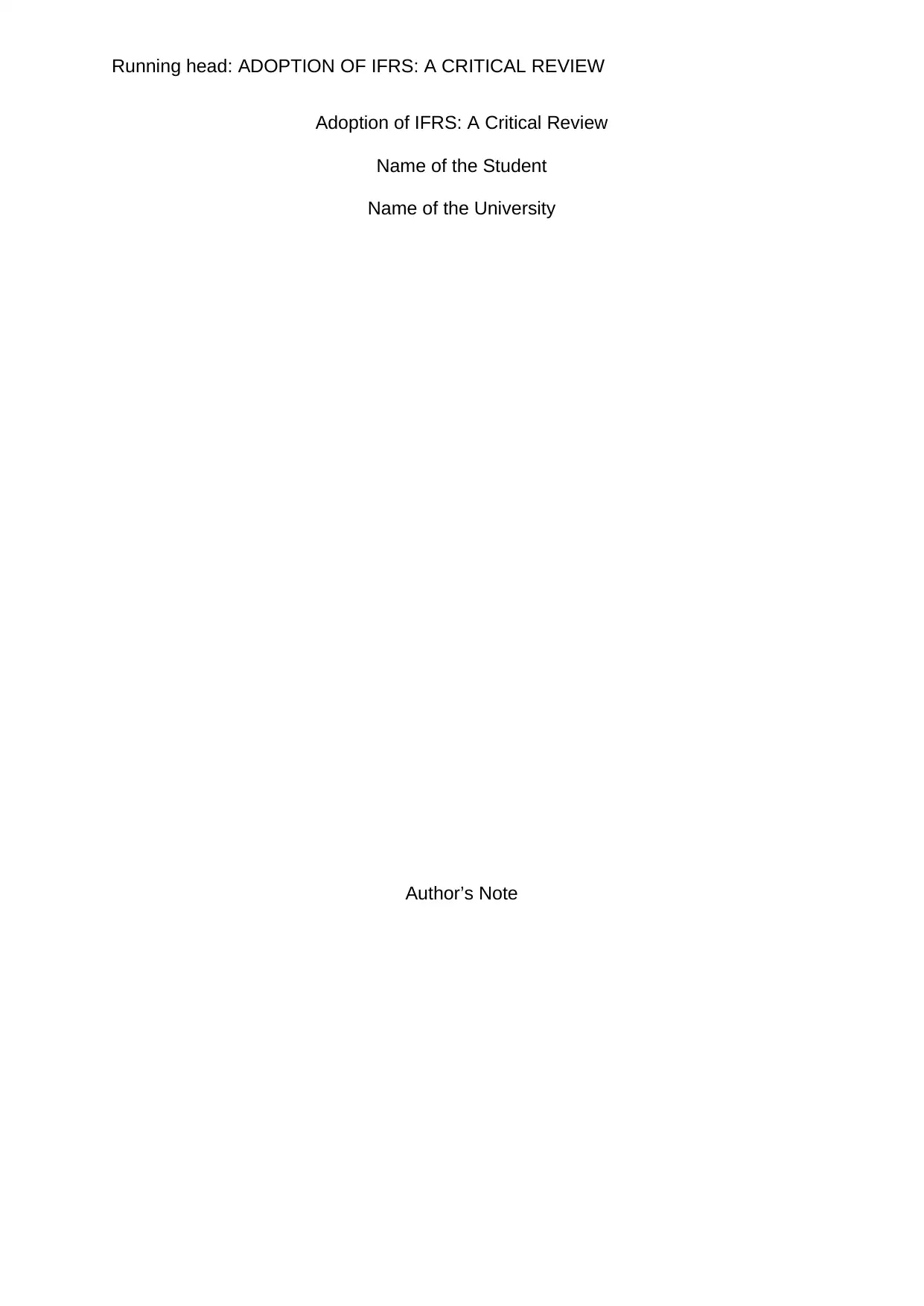
Running head: ADOPTION OF IFRS: A CRITICAL REVIEW
Adoption of IFRS: A Critical Review
Name of the Student
Name of the University
Author’s Note
Adoption of IFRS: A Critical Review
Name of the Student
Name of the University
Author’s Note
Paraphrase This Document
Need a fresh take? Get an instant paraphrase of this document with our AI Paraphraser
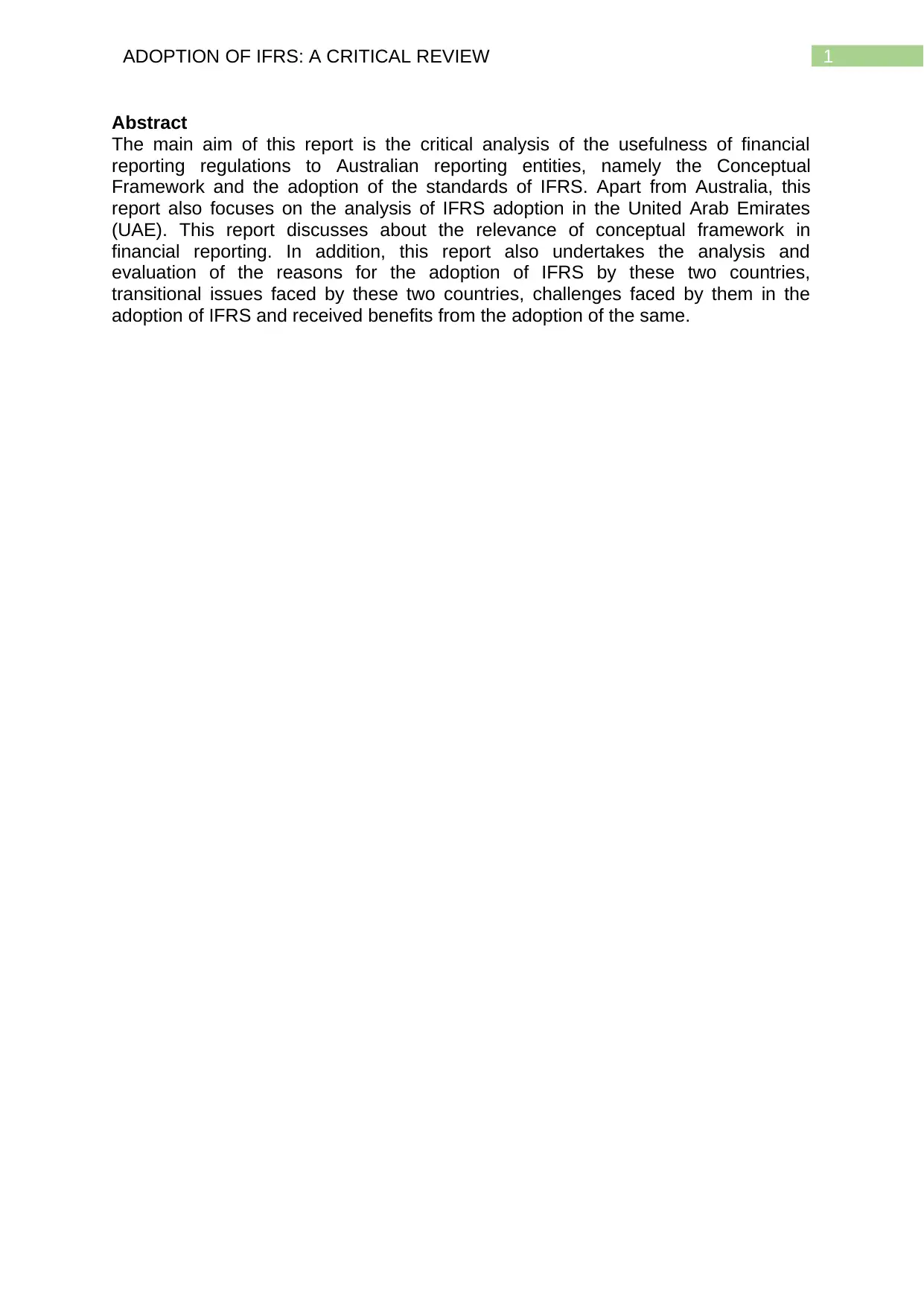
1ADOPTION OF IFRS: A CRITICAL REVIEW
Abstract
The main aim of this report is the critical analysis of the usefulness of financial
reporting regulations to Australian reporting entities, namely the Conceptual
Framework and the adoption of the standards of IFRS. Apart from Australia, this
report also focuses on the analysis of IFRS adoption in the United Arab Emirates
(UAE). This report discusses about the relevance of conceptual framework in
financial reporting. In addition, this report also undertakes the analysis and
evaluation of the reasons for the adoption of IFRS by these two countries,
transitional issues faced by these two countries, challenges faced by them in the
adoption of IFRS and received benefits from the adoption of the same.
Abstract
The main aim of this report is the critical analysis of the usefulness of financial
reporting regulations to Australian reporting entities, namely the Conceptual
Framework and the adoption of the standards of IFRS. Apart from Australia, this
report also focuses on the analysis of IFRS adoption in the United Arab Emirates
(UAE). This report discusses about the relevance of conceptual framework in
financial reporting. In addition, this report also undertakes the analysis and
evaluation of the reasons for the adoption of IFRS by these two countries,
transitional issues faced by these two countries, challenges faced by them in the
adoption of IFRS and received benefits from the adoption of the same.
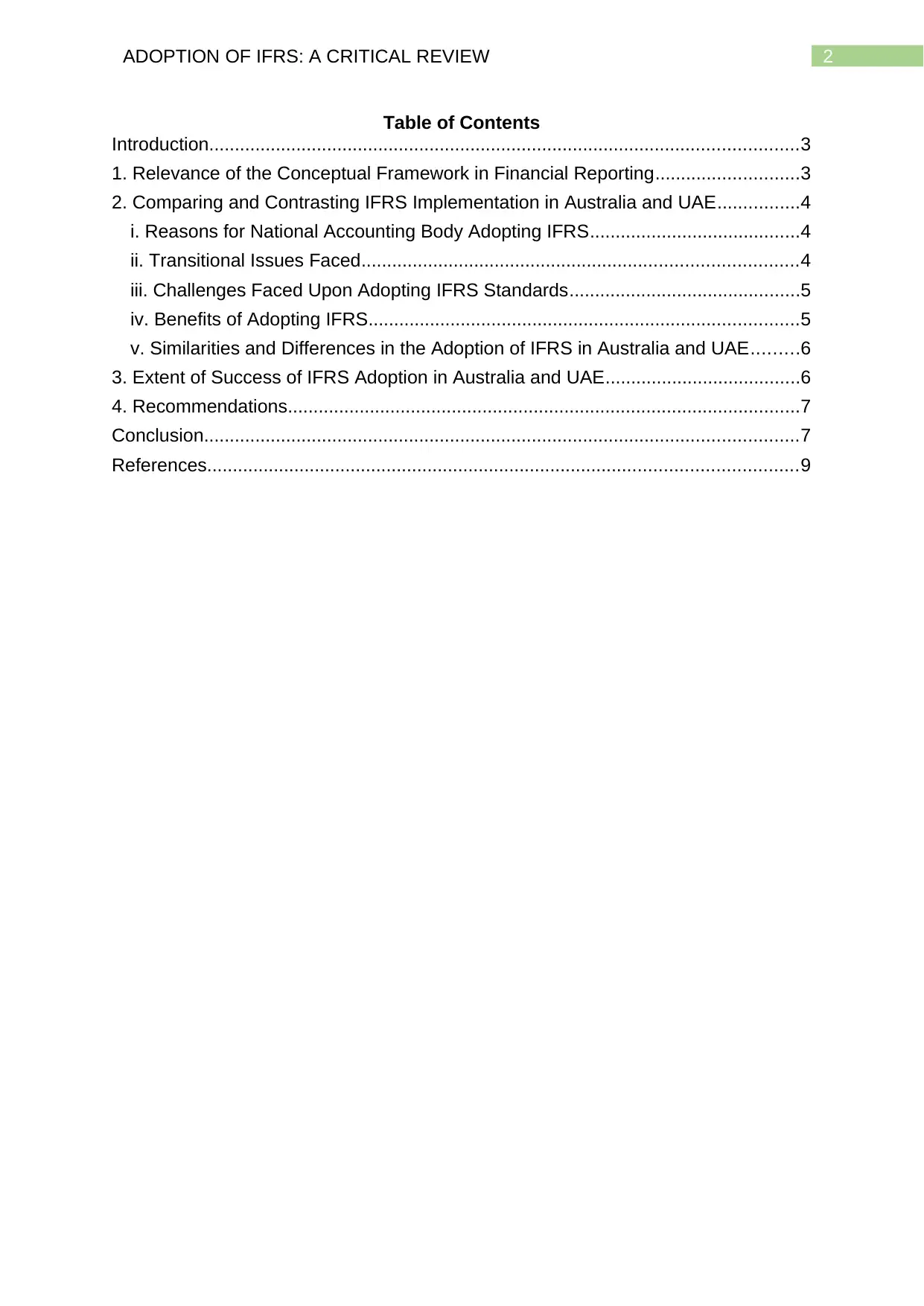
2ADOPTION OF IFRS: A CRITICAL REVIEW
Table of Contents
Introduction...................................................................................................................3
1. Relevance of the Conceptual Framework in Financial Reporting............................3
2. Comparing and Contrasting IFRS Implementation in Australia and UAE................4
i. Reasons for National Accounting Body Adopting IFRS.........................................4
ii. Transitional Issues Faced.....................................................................................4
iii. Challenges Faced Upon Adopting IFRS Standards.............................................5
iv. Benefits of Adopting IFRS....................................................................................5
v. Similarities and Differences in the Adoption of IFRS in Australia and UAE.........6
3. Extent of Success of IFRS Adoption in Australia and UAE......................................6
4. Recommendations....................................................................................................7
Conclusion....................................................................................................................7
References...................................................................................................................9
Table of Contents
Introduction...................................................................................................................3
1. Relevance of the Conceptual Framework in Financial Reporting............................3
2. Comparing and Contrasting IFRS Implementation in Australia and UAE................4
i. Reasons for National Accounting Body Adopting IFRS.........................................4
ii. Transitional Issues Faced.....................................................................................4
iii. Challenges Faced Upon Adopting IFRS Standards.............................................5
iv. Benefits of Adopting IFRS....................................................................................5
v. Similarities and Differences in the Adoption of IFRS in Australia and UAE.........6
3. Extent of Success of IFRS Adoption in Australia and UAE......................................6
4. Recommendations....................................................................................................7
Conclusion....................................................................................................................7
References...................................................................................................................9
⊘ This is a preview!⊘
Do you want full access?
Subscribe today to unlock all pages.

Trusted by 1+ million students worldwide
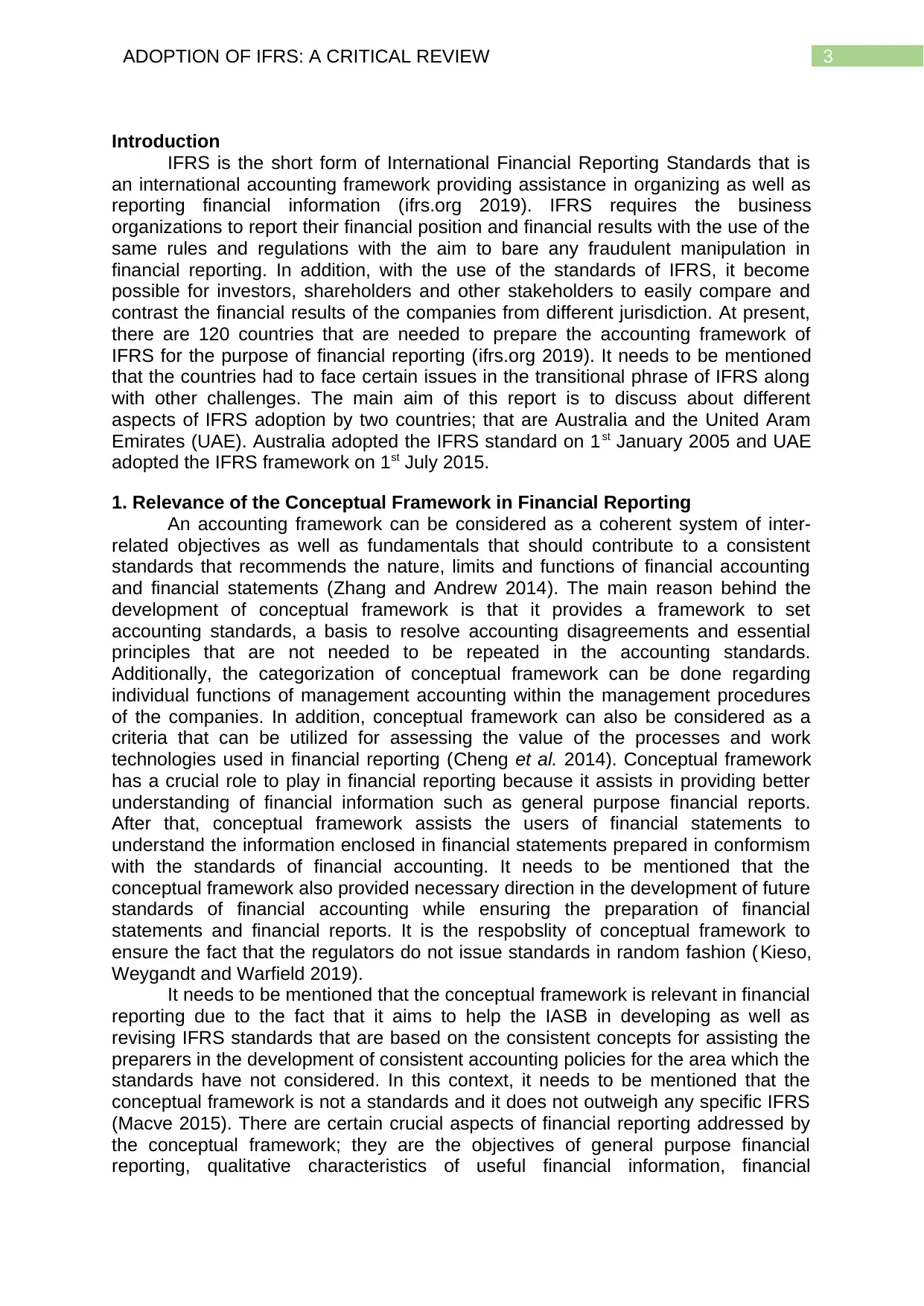
3ADOPTION OF IFRS: A CRITICAL REVIEW
Introduction
IFRS is the short form of International Financial Reporting Standards that is
an international accounting framework providing assistance in organizing as well as
reporting financial information (ifrs.org 2019). IFRS requires the business
organizations to report their financial position and financial results with the use of the
same rules and regulations with the aim to bare any fraudulent manipulation in
financial reporting. In addition, with the use of the standards of IFRS, it become
possible for investors, shareholders and other stakeholders to easily compare and
contrast the financial results of the companies from different jurisdiction. At present,
there are 120 countries that are needed to prepare the accounting framework of
IFRS for the purpose of financial reporting (ifrs.org 2019). It needs to be mentioned
that the countries had to face certain issues in the transitional phrase of IFRS along
with other challenges. The main aim of this report is to discuss about different
aspects of IFRS adoption by two countries; that are Australia and the United Aram
Emirates (UAE). Australia adopted the IFRS standard on 1st January 2005 and UAE
adopted the IFRS framework on 1st July 2015.
1. Relevance of the Conceptual Framework in Financial Reporting
An accounting framework can be considered as a coherent system of inter-
related objectives as well as fundamentals that should contribute to a consistent
standards that recommends the nature, limits and functions of financial accounting
and financial statements (Zhang and Andrew 2014). The main reason behind the
development of conceptual framework is that it provides a framework to set
accounting standards, a basis to resolve accounting disagreements and essential
principles that are not needed to be repeated in the accounting standards.
Additionally, the categorization of conceptual framework can be done regarding
individual functions of management accounting within the management procedures
of the companies. In addition, conceptual framework can also be considered as a
criteria that can be utilized for assessing the value of the processes and work
technologies used in financial reporting (Cheng et al. 2014). Conceptual framework
has a crucial role to play in financial reporting because it assists in providing better
understanding of financial information such as general purpose financial reports.
After that, conceptual framework assists the users of financial statements to
understand the information enclosed in financial statements prepared in conformism
with the standards of financial accounting. It needs to be mentioned that the
conceptual framework also provided necessary direction in the development of future
standards of financial accounting while ensuring the preparation of financial
statements and financial reports. It is the respobslity of conceptual framework to
ensure the fact that the regulators do not issue standards in random fashion ( Kieso,
Weygandt and Warfield 2019).
It needs to be mentioned that the conceptual framework is relevant in financial
reporting due to the fact that it aims to help the IASB in developing as well as
revising IFRS standards that are based on the consistent concepts for assisting the
preparers in the development of consistent accounting policies for the area which the
standards have not considered. In this context, it needs to be mentioned that the
conceptual framework is not a standards and it does not outweigh any specific IFRS
(Macve 2015). There are certain crucial aspects of financial reporting addressed by
the conceptual framework; they are the objectives of general purpose financial
reporting, qualitative characteristics of useful financial information, financial
Introduction
IFRS is the short form of International Financial Reporting Standards that is
an international accounting framework providing assistance in organizing as well as
reporting financial information (ifrs.org 2019). IFRS requires the business
organizations to report their financial position and financial results with the use of the
same rules and regulations with the aim to bare any fraudulent manipulation in
financial reporting. In addition, with the use of the standards of IFRS, it become
possible for investors, shareholders and other stakeholders to easily compare and
contrast the financial results of the companies from different jurisdiction. At present,
there are 120 countries that are needed to prepare the accounting framework of
IFRS for the purpose of financial reporting (ifrs.org 2019). It needs to be mentioned
that the countries had to face certain issues in the transitional phrase of IFRS along
with other challenges. The main aim of this report is to discuss about different
aspects of IFRS adoption by two countries; that are Australia and the United Aram
Emirates (UAE). Australia adopted the IFRS standard on 1st January 2005 and UAE
adopted the IFRS framework on 1st July 2015.
1. Relevance of the Conceptual Framework in Financial Reporting
An accounting framework can be considered as a coherent system of inter-
related objectives as well as fundamentals that should contribute to a consistent
standards that recommends the nature, limits and functions of financial accounting
and financial statements (Zhang and Andrew 2014). The main reason behind the
development of conceptual framework is that it provides a framework to set
accounting standards, a basis to resolve accounting disagreements and essential
principles that are not needed to be repeated in the accounting standards.
Additionally, the categorization of conceptual framework can be done regarding
individual functions of management accounting within the management procedures
of the companies. In addition, conceptual framework can also be considered as a
criteria that can be utilized for assessing the value of the processes and work
technologies used in financial reporting (Cheng et al. 2014). Conceptual framework
has a crucial role to play in financial reporting because it assists in providing better
understanding of financial information such as general purpose financial reports.
After that, conceptual framework assists the users of financial statements to
understand the information enclosed in financial statements prepared in conformism
with the standards of financial accounting. It needs to be mentioned that the
conceptual framework also provided necessary direction in the development of future
standards of financial accounting while ensuring the preparation of financial
statements and financial reports. It is the respobslity of conceptual framework to
ensure the fact that the regulators do not issue standards in random fashion ( Kieso,
Weygandt and Warfield 2019).
It needs to be mentioned that the conceptual framework is relevant in financial
reporting due to the fact that it aims to help the IASB in developing as well as
revising IFRS standards that are based on the consistent concepts for assisting the
preparers in the development of consistent accounting policies for the area which the
standards have not considered. In this context, it needs to be mentioned that the
conceptual framework is not a standards and it does not outweigh any specific IFRS
(Macve 2015). There are certain crucial aspects of financial reporting addressed by
the conceptual framework; they are the objectives of general purpose financial
reporting, qualitative characteristics of useful financial information, financial
Paraphrase This Document
Need a fresh take? Get an instant paraphrase of this document with our AI Paraphraser
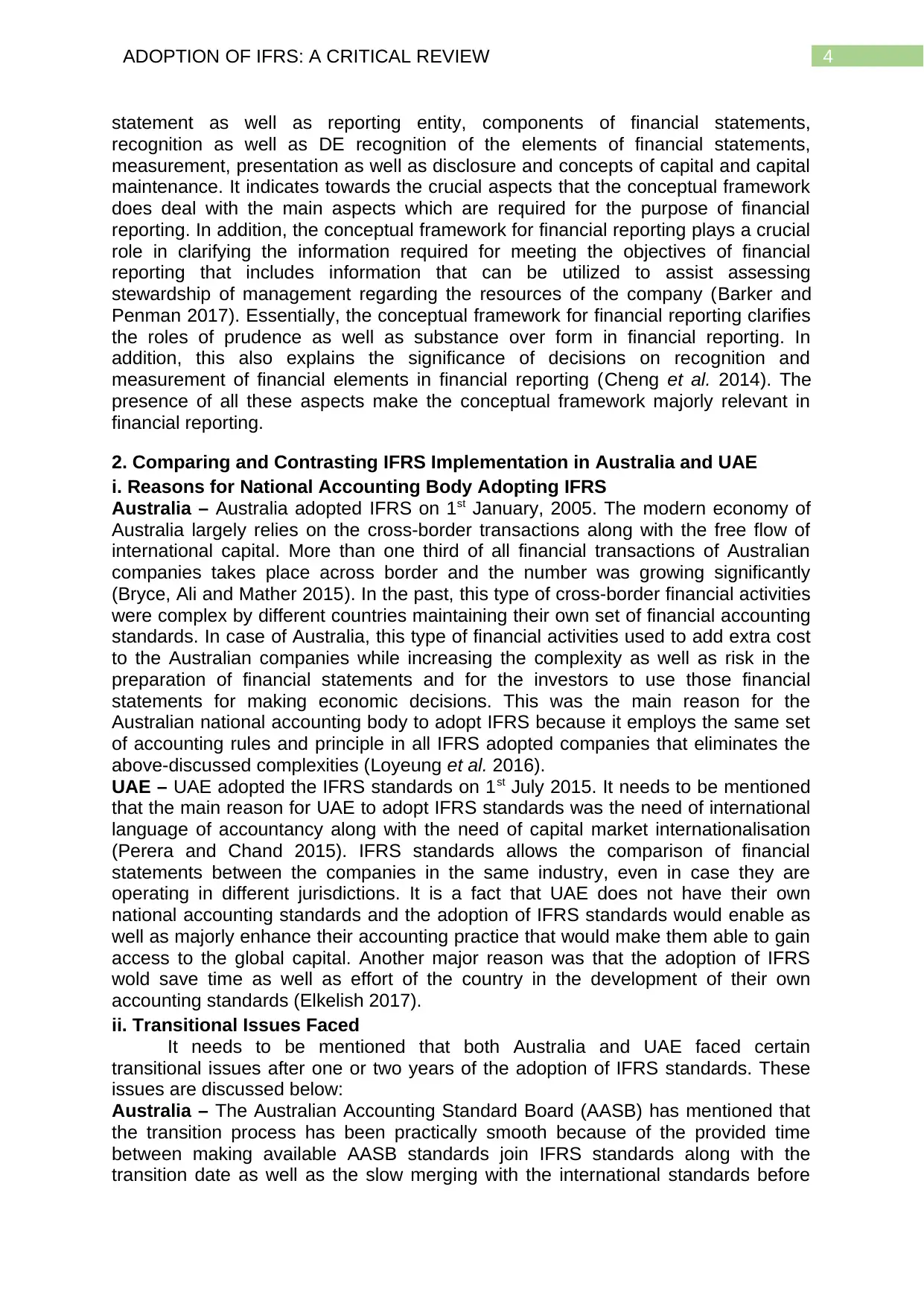
4ADOPTION OF IFRS: A CRITICAL REVIEW
statement as well as reporting entity, components of financial statements,
recognition as well as DE recognition of the elements of financial statements,
measurement, presentation as well as disclosure and concepts of capital and capital
maintenance. It indicates towards the crucial aspects that the conceptual framework
does deal with the main aspects which are required for the purpose of financial
reporting. In addition, the conceptual framework for financial reporting plays a crucial
role in clarifying the information required for meeting the objectives of financial
reporting that includes information that can be utilized to assist assessing
stewardship of management regarding the resources of the company (Barker and
Penman 2017). Essentially, the conceptual framework for financial reporting clarifies
the roles of prudence as well as substance over form in financial reporting. In
addition, this also explains the significance of decisions on recognition and
measurement of financial elements in financial reporting (Cheng et al. 2014). The
presence of all these aspects make the conceptual framework majorly relevant in
financial reporting.
2. Comparing and Contrasting IFRS Implementation in Australia and UAE
i. Reasons for National Accounting Body Adopting IFRS
Australia – Australia adopted IFRS on 1st January, 2005. The modern economy of
Australia largely relies on the cross-border transactions along with the free flow of
international capital. More than one third of all financial transactions of Australian
companies takes place across border and the number was growing significantly
(Bryce, Ali and Mather 2015). In the past, this type of cross-border financial activities
were complex by different countries maintaining their own set of financial accounting
standards. In case of Australia, this type of financial activities used to add extra cost
to the Australian companies while increasing the complexity as well as risk in the
preparation of financial statements and for the investors to use those financial
statements for making economic decisions. This was the main reason for the
Australian national accounting body to adopt IFRS because it employs the same set
of accounting rules and principle in all IFRS adopted companies that eliminates the
above-discussed complexities (Loyeung et al. 2016).
UAE – UAE adopted the IFRS standards on 1st July 2015. It needs to be mentioned
that the main reason for UAE to adopt IFRS standards was the need of international
language of accountancy along with the need of capital market internationalisation
(Perera and Chand 2015). IFRS standards allows the comparison of financial
statements between the companies in the same industry, even in case they are
operating in different jurisdictions. It is a fact that UAE does not have their own
national accounting standards and the adoption of IFRS standards would enable as
well as majorly enhance their accounting practice that would make them able to gain
access to the global capital. Another major reason was that the adoption of IFRS
wold save time as well as effort of the country in the development of their own
accounting standards (Elkelish 2017).
ii. Transitional Issues Faced
It needs to be mentioned that both Australia and UAE faced certain
transitional issues after one or two years of the adoption of IFRS standards. These
issues are discussed below:
Australia – The Australian Accounting Standard Board (AASB) has mentioned that
the transition process has been practically smooth because of the provided time
between making available AASB standards join IFRS standards along with the
transition date as well as the slow merging with the international standards before
statement as well as reporting entity, components of financial statements,
recognition as well as DE recognition of the elements of financial statements,
measurement, presentation as well as disclosure and concepts of capital and capital
maintenance. It indicates towards the crucial aspects that the conceptual framework
does deal with the main aspects which are required for the purpose of financial
reporting. In addition, the conceptual framework for financial reporting plays a crucial
role in clarifying the information required for meeting the objectives of financial
reporting that includes information that can be utilized to assist assessing
stewardship of management regarding the resources of the company (Barker and
Penman 2017). Essentially, the conceptual framework for financial reporting clarifies
the roles of prudence as well as substance over form in financial reporting. In
addition, this also explains the significance of decisions on recognition and
measurement of financial elements in financial reporting (Cheng et al. 2014). The
presence of all these aspects make the conceptual framework majorly relevant in
financial reporting.
2. Comparing and Contrasting IFRS Implementation in Australia and UAE
i. Reasons for National Accounting Body Adopting IFRS
Australia – Australia adopted IFRS on 1st January, 2005. The modern economy of
Australia largely relies on the cross-border transactions along with the free flow of
international capital. More than one third of all financial transactions of Australian
companies takes place across border and the number was growing significantly
(Bryce, Ali and Mather 2015). In the past, this type of cross-border financial activities
were complex by different countries maintaining their own set of financial accounting
standards. In case of Australia, this type of financial activities used to add extra cost
to the Australian companies while increasing the complexity as well as risk in the
preparation of financial statements and for the investors to use those financial
statements for making economic decisions. This was the main reason for the
Australian national accounting body to adopt IFRS because it employs the same set
of accounting rules and principle in all IFRS adopted companies that eliminates the
above-discussed complexities (Loyeung et al. 2016).
UAE – UAE adopted the IFRS standards on 1st July 2015. It needs to be mentioned
that the main reason for UAE to adopt IFRS standards was the need of international
language of accountancy along with the need of capital market internationalisation
(Perera and Chand 2015). IFRS standards allows the comparison of financial
statements between the companies in the same industry, even in case they are
operating in different jurisdictions. It is a fact that UAE does not have their own
national accounting standards and the adoption of IFRS standards would enable as
well as majorly enhance their accounting practice that would make them able to gain
access to the global capital. Another major reason was that the adoption of IFRS
wold save time as well as effort of the country in the development of their own
accounting standards (Elkelish 2017).
ii. Transitional Issues Faced
It needs to be mentioned that both Australia and UAE faced certain
transitional issues after one or two years of the adoption of IFRS standards. These
issues are discussed below:
Australia – The Australian Accounting Standard Board (AASB) has mentioned that
the transition process has been practically smooth because of the provided time
between making available AASB standards join IFRS standards along with the
transition date as well as the slow merging with the international standards before
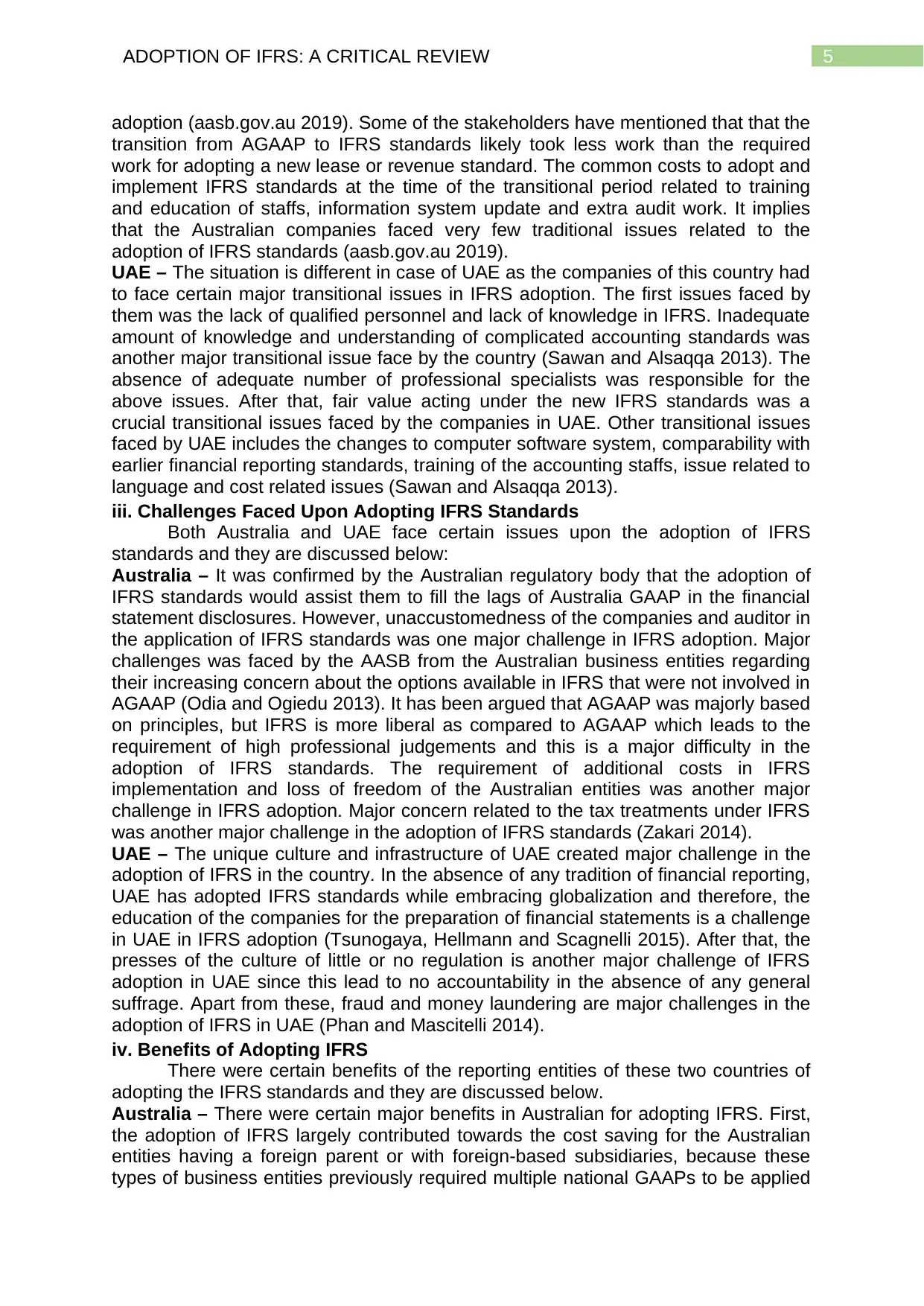
5ADOPTION OF IFRS: A CRITICAL REVIEW
adoption (aasb.gov.au 2019). Some of the stakeholders have mentioned that that the
transition from AGAAP to IFRS standards likely took less work than the required
work for adopting a new lease or revenue standard. The common costs to adopt and
implement IFRS standards at the time of the transitional period related to training
and education of staffs, information system update and extra audit work. It implies
that the Australian companies faced very few traditional issues related to the
adoption of IFRS standards (aasb.gov.au 2019).
UAE – The situation is different in case of UAE as the companies of this country had
to face certain major transitional issues in IFRS adoption. The first issues faced by
them was the lack of qualified personnel and lack of knowledge in IFRS. Inadequate
amount of knowledge and understanding of complicated accounting standards was
another major transitional issue face by the country (Sawan and Alsaqqa 2013). The
absence of adequate number of professional specialists was responsible for the
above issues. After that, fair value acting under the new IFRS standards was a
crucial transitional issues faced by the companies in UAE. Other transitional issues
faced by UAE includes the changes to computer software system, comparability with
earlier financial reporting standards, training of the accounting staffs, issue related to
language and cost related issues (Sawan and Alsaqqa 2013).
iii. Challenges Faced Upon Adopting IFRS Standards
Both Australia and UAE face certain issues upon the adoption of IFRS
standards and they are discussed below:
Australia – It was confirmed by the Australian regulatory body that the adoption of
IFRS standards would assist them to fill the lags of Australia GAAP in the financial
statement disclosures. However, unaccustomedness of the companies and auditor in
the application of IFRS standards was one major challenge in IFRS adoption. Major
challenges was faced by the AASB from the Australian business entities regarding
their increasing concern about the options available in IFRS that were not involved in
AGAAP (Odia and Ogiedu 2013). It has been argued that AGAAP was majorly based
on principles, but IFRS is more liberal as compared to AGAAP which leads to the
requirement of high professional judgements and this is a major difficulty in the
adoption of IFRS standards. The requirement of additional costs in IFRS
implementation and loss of freedom of the Australian entities was another major
challenge in IFRS adoption. Major concern related to the tax treatments under IFRS
was another major challenge in the adoption of IFRS standards (Zakari 2014).
UAE – The unique culture and infrastructure of UAE created major challenge in the
adoption of IFRS in the country. In the absence of any tradition of financial reporting,
UAE has adopted IFRS standards while embracing globalization and therefore, the
education of the companies for the preparation of financial statements is a challenge
in UAE in IFRS adoption (Tsunogaya, Hellmann and Scagnelli 2015). After that, the
presses of the culture of little or no regulation is another major challenge of IFRS
adoption in UAE since this lead to no accountability in the absence of any general
suffrage. Apart from these, fraud and money laundering are major challenges in the
adoption of IFRS in UAE (Phan and Mascitelli 2014).
iv. Benefits of Adopting IFRS
There were certain benefits of the reporting entities of these two countries of
adopting the IFRS standards and they are discussed below.
Australia – There were certain major benefits in Australian for adopting IFRS. First,
the adoption of IFRS largely contributed towards the cost saving for the Australian
entities having a foreign parent or with foreign-based subsidiaries, because these
types of business entities previously required multiple national GAAPs to be applied
adoption (aasb.gov.au 2019). Some of the stakeholders have mentioned that that the
transition from AGAAP to IFRS standards likely took less work than the required
work for adopting a new lease or revenue standard. The common costs to adopt and
implement IFRS standards at the time of the transitional period related to training
and education of staffs, information system update and extra audit work. It implies
that the Australian companies faced very few traditional issues related to the
adoption of IFRS standards (aasb.gov.au 2019).
UAE – The situation is different in case of UAE as the companies of this country had
to face certain major transitional issues in IFRS adoption. The first issues faced by
them was the lack of qualified personnel and lack of knowledge in IFRS. Inadequate
amount of knowledge and understanding of complicated accounting standards was
another major transitional issue face by the country (Sawan and Alsaqqa 2013). The
absence of adequate number of professional specialists was responsible for the
above issues. After that, fair value acting under the new IFRS standards was a
crucial transitional issues faced by the companies in UAE. Other transitional issues
faced by UAE includes the changes to computer software system, comparability with
earlier financial reporting standards, training of the accounting staffs, issue related to
language and cost related issues (Sawan and Alsaqqa 2013).
iii. Challenges Faced Upon Adopting IFRS Standards
Both Australia and UAE face certain issues upon the adoption of IFRS
standards and they are discussed below:
Australia – It was confirmed by the Australian regulatory body that the adoption of
IFRS standards would assist them to fill the lags of Australia GAAP in the financial
statement disclosures. However, unaccustomedness of the companies and auditor in
the application of IFRS standards was one major challenge in IFRS adoption. Major
challenges was faced by the AASB from the Australian business entities regarding
their increasing concern about the options available in IFRS that were not involved in
AGAAP (Odia and Ogiedu 2013). It has been argued that AGAAP was majorly based
on principles, but IFRS is more liberal as compared to AGAAP which leads to the
requirement of high professional judgements and this is a major difficulty in the
adoption of IFRS standards. The requirement of additional costs in IFRS
implementation and loss of freedom of the Australian entities was another major
challenge in IFRS adoption. Major concern related to the tax treatments under IFRS
was another major challenge in the adoption of IFRS standards (Zakari 2014).
UAE – The unique culture and infrastructure of UAE created major challenge in the
adoption of IFRS in the country. In the absence of any tradition of financial reporting,
UAE has adopted IFRS standards while embracing globalization and therefore, the
education of the companies for the preparation of financial statements is a challenge
in UAE in IFRS adoption (Tsunogaya, Hellmann and Scagnelli 2015). After that, the
presses of the culture of little or no regulation is another major challenge of IFRS
adoption in UAE since this lead to no accountability in the absence of any general
suffrage. Apart from these, fraud and money laundering are major challenges in the
adoption of IFRS in UAE (Phan and Mascitelli 2014).
iv. Benefits of Adopting IFRS
There were certain benefits of the reporting entities of these two countries of
adopting the IFRS standards and they are discussed below.
Australia – There were certain major benefits in Australian for adopting IFRS. First,
the adoption of IFRS largely contributed towards the cost saving for the Australian
entities having a foreign parent or with foreign-based subsidiaries, because these
types of business entities previously required multiple national GAAPs to be applied
⊘ This is a preview!⊘
Do you want full access?
Subscribe today to unlock all pages.

Trusted by 1+ million students worldwide
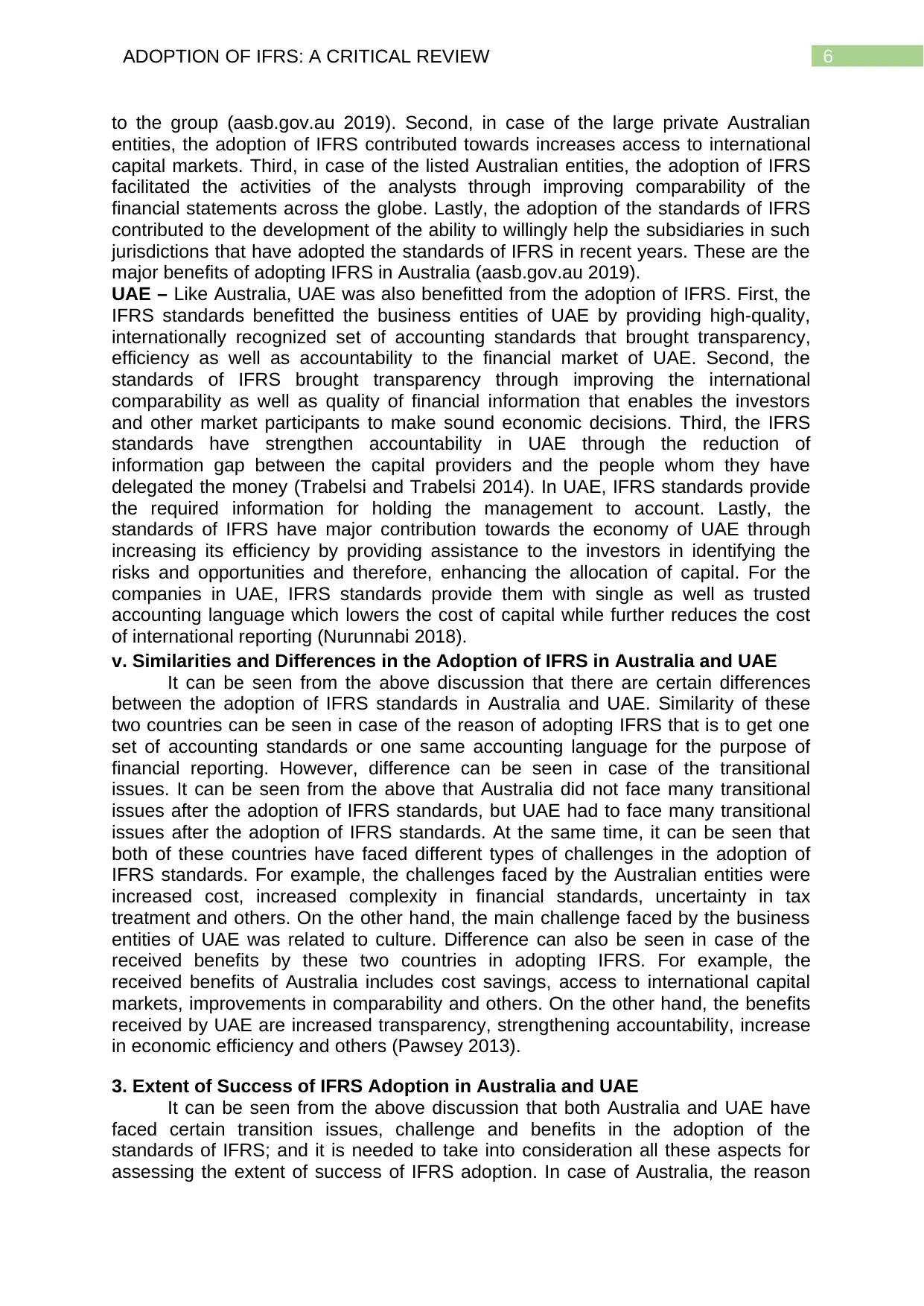
6ADOPTION OF IFRS: A CRITICAL REVIEW
to the group (aasb.gov.au 2019). Second, in case of the large private Australian
entities, the adoption of IFRS contributed towards increases access to international
capital markets. Third, in case of the listed Australian entities, the adoption of IFRS
facilitated the activities of the analysts through improving comparability of the
financial statements across the globe. Lastly, the adoption of the standards of IFRS
contributed to the development of the ability to willingly help the subsidiaries in such
jurisdictions that have adopted the standards of IFRS in recent years. These are the
major benefits of adopting IFRS in Australia (aasb.gov.au 2019).
UAE – Like Australia, UAE was also benefitted from the adoption of IFRS. First, the
IFRS standards benefitted the business entities of UAE by providing high-quality,
internationally recognized set of accounting standards that brought transparency,
efficiency as well as accountability to the financial market of UAE. Second, the
standards of IFRS brought transparency through improving the international
comparability as well as quality of financial information that enables the investors
and other market participants to make sound economic decisions. Third, the IFRS
standards have strengthen accountability in UAE through the reduction of
information gap between the capital providers and the people whom they have
delegated the money (Trabelsi and Trabelsi 2014). In UAE, IFRS standards provide
the required information for holding the management to account. Lastly, the
standards of IFRS have major contribution towards the economy of UAE through
increasing its efficiency by providing assistance to the investors in identifying the
risks and opportunities and therefore, enhancing the allocation of capital. For the
companies in UAE, IFRS standards provide them with single as well as trusted
accounting language which lowers the cost of capital while further reduces the cost
of international reporting (Nurunnabi 2018).
v. Similarities and Differences in the Adoption of IFRS in Australia and UAE
It can be seen from the above discussion that there are certain differences
between the adoption of IFRS standards in Australia and UAE. Similarity of these
two countries can be seen in case of the reason of adopting IFRS that is to get one
set of accounting standards or one same accounting language for the purpose of
financial reporting. However, difference can be seen in case of the transitional
issues. It can be seen from the above that Australia did not face many transitional
issues after the adoption of IFRS standards, but UAE had to face many transitional
issues after the adoption of IFRS standards. At the same time, it can be seen that
both of these countries have faced different types of challenges in the adoption of
IFRS standards. For example, the challenges faced by the Australian entities were
increased cost, increased complexity in financial standards, uncertainty in tax
treatment and others. On the other hand, the main challenge faced by the business
entities of UAE was related to culture. Difference can also be seen in case of the
received benefits by these two countries in adopting IFRS. For example, the
received benefits of Australia includes cost savings, access to international capital
markets, improvements in comparability and others. On the other hand, the benefits
received by UAE are increased transparency, strengthening accountability, increase
in economic efficiency and others (Pawsey 2013).
3. Extent of Success of IFRS Adoption in Australia and UAE
It can be seen from the above discussion that both Australia and UAE have
faced certain transition issues, challenge and benefits in the adoption of the
standards of IFRS; and it is needed to take into consideration all these aspects for
assessing the extent of success of IFRS adoption. In case of Australia, the reason
to the group (aasb.gov.au 2019). Second, in case of the large private Australian
entities, the adoption of IFRS contributed towards increases access to international
capital markets. Third, in case of the listed Australian entities, the adoption of IFRS
facilitated the activities of the analysts through improving comparability of the
financial statements across the globe. Lastly, the adoption of the standards of IFRS
contributed to the development of the ability to willingly help the subsidiaries in such
jurisdictions that have adopted the standards of IFRS in recent years. These are the
major benefits of adopting IFRS in Australia (aasb.gov.au 2019).
UAE – Like Australia, UAE was also benefitted from the adoption of IFRS. First, the
IFRS standards benefitted the business entities of UAE by providing high-quality,
internationally recognized set of accounting standards that brought transparency,
efficiency as well as accountability to the financial market of UAE. Second, the
standards of IFRS brought transparency through improving the international
comparability as well as quality of financial information that enables the investors
and other market participants to make sound economic decisions. Third, the IFRS
standards have strengthen accountability in UAE through the reduction of
information gap between the capital providers and the people whom they have
delegated the money (Trabelsi and Trabelsi 2014). In UAE, IFRS standards provide
the required information for holding the management to account. Lastly, the
standards of IFRS have major contribution towards the economy of UAE through
increasing its efficiency by providing assistance to the investors in identifying the
risks and opportunities and therefore, enhancing the allocation of capital. For the
companies in UAE, IFRS standards provide them with single as well as trusted
accounting language which lowers the cost of capital while further reduces the cost
of international reporting (Nurunnabi 2018).
v. Similarities and Differences in the Adoption of IFRS in Australia and UAE
It can be seen from the above discussion that there are certain differences
between the adoption of IFRS standards in Australia and UAE. Similarity of these
two countries can be seen in case of the reason of adopting IFRS that is to get one
set of accounting standards or one same accounting language for the purpose of
financial reporting. However, difference can be seen in case of the transitional
issues. It can be seen from the above that Australia did not face many transitional
issues after the adoption of IFRS standards, but UAE had to face many transitional
issues after the adoption of IFRS standards. At the same time, it can be seen that
both of these countries have faced different types of challenges in the adoption of
IFRS standards. For example, the challenges faced by the Australian entities were
increased cost, increased complexity in financial standards, uncertainty in tax
treatment and others. On the other hand, the main challenge faced by the business
entities of UAE was related to culture. Difference can also be seen in case of the
received benefits by these two countries in adopting IFRS. For example, the
received benefits of Australia includes cost savings, access to international capital
markets, improvements in comparability and others. On the other hand, the benefits
received by UAE are increased transparency, strengthening accountability, increase
in economic efficiency and others (Pawsey 2013).
3. Extent of Success of IFRS Adoption in Australia and UAE
It can be seen from the above discussion that both Australia and UAE have
faced certain transition issues, challenge and benefits in the adoption of the
standards of IFRS; and it is needed to take into consideration all these aspects for
assessing the extent of success of IFRS adoption. In case of Australia, the reason
Paraphrase This Document
Need a fresh take? Get an instant paraphrase of this document with our AI Paraphraser
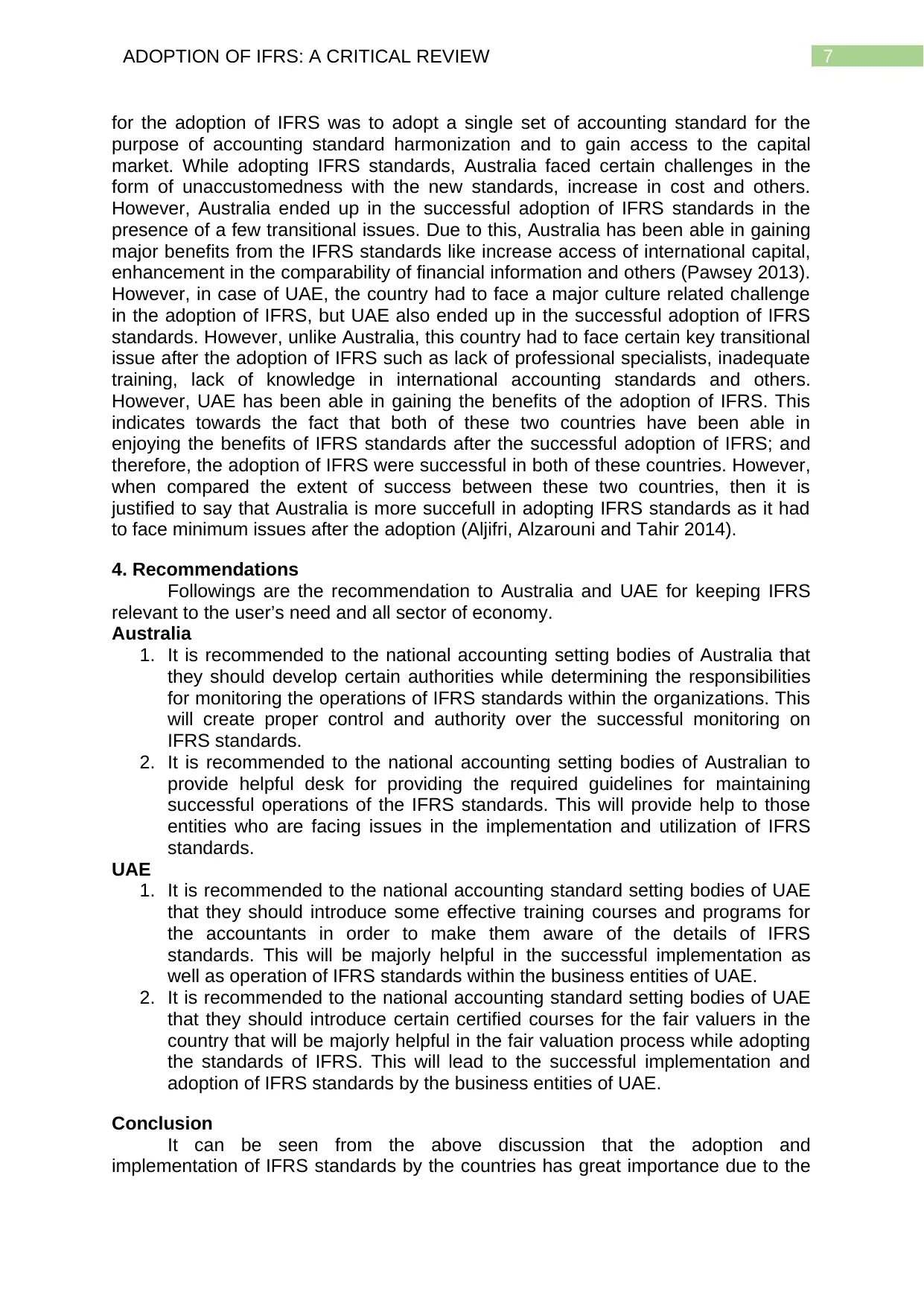
7ADOPTION OF IFRS: A CRITICAL REVIEW
for the adoption of IFRS was to adopt a single set of accounting standard for the
purpose of accounting standard harmonization and to gain access to the capital
market. While adopting IFRS standards, Australia faced certain challenges in the
form of unaccustomedness with the new standards, increase in cost and others.
However, Australia ended up in the successful adoption of IFRS standards in the
presence of a few transitional issues. Due to this, Australia has been able in gaining
major benefits from the IFRS standards like increase access of international capital,
enhancement in the comparability of financial information and others (Pawsey 2013).
However, in case of UAE, the country had to face a major culture related challenge
in the adoption of IFRS, but UAE also ended up in the successful adoption of IFRS
standards. However, unlike Australia, this country had to face certain key transitional
issue after the adoption of IFRS such as lack of professional specialists, inadequate
training, lack of knowledge in international accounting standards and others.
However, UAE has been able in gaining the benefits of the adoption of IFRS. This
indicates towards the fact that both of these two countries have been able in
enjoying the benefits of IFRS standards after the successful adoption of IFRS; and
therefore, the adoption of IFRS were successful in both of these countries. However,
when compared the extent of success between these two countries, then it is
justified to say that Australia is more succefull in adopting IFRS standards as it had
to face minimum issues after the adoption (Aljifri, Alzarouni and Tahir 2014).
4. Recommendations
Followings are the recommendation to Australia and UAE for keeping IFRS
relevant to the user’s need and all sector of economy.
Australia
1. It is recommended to the national accounting setting bodies of Australia that
they should develop certain authorities while determining the responsibilities
for monitoring the operations of IFRS standards within the organizations. This
will create proper control and authority over the successful monitoring on
IFRS standards.
2. It is recommended to the national accounting setting bodies of Australian to
provide helpful desk for providing the required guidelines for maintaining
successful operations of the IFRS standards. This will provide help to those
entities who are facing issues in the implementation and utilization of IFRS
standards.
UAE
1. It is recommended to the national accounting standard setting bodies of UAE
that they should introduce some effective training courses and programs for
the accountants in order to make them aware of the details of IFRS
standards. This will be majorly helpful in the successful implementation as
well as operation of IFRS standards within the business entities of UAE.
2. It is recommended to the national accounting standard setting bodies of UAE
that they should introduce certain certified courses for the fair valuers in the
country that will be majorly helpful in the fair valuation process while adopting
the standards of IFRS. This will lead to the successful implementation and
adoption of IFRS standards by the business entities of UAE.
Conclusion
It can be seen from the above discussion that the adoption and
implementation of IFRS standards by the countries has great importance due to the
for the adoption of IFRS was to adopt a single set of accounting standard for the
purpose of accounting standard harmonization and to gain access to the capital
market. While adopting IFRS standards, Australia faced certain challenges in the
form of unaccustomedness with the new standards, increase in cost and others.
However, Australia ended up in the successful adoption of IFRS standards in the
presence of a few transitional issues. Due to this, Australia has been able in gaining
major benefits from the IFRS standards like increase access of international capital,
enhancement in the comparability of financial information and others (Pawsey 2013).
However, in case of UAE, the country had to face a major culture related challenge
in the adoption of IFRS, but UAE also ended up in the successful adoption of IFRS
standards. However, unlike Australia, this country had to face certain key transitional
issue after the adoption of IFRS such as lack of professional specialists, inadequate
training, lack of knowledge in international accounting standards and others.
However, UAE has been able in gaining the benefits of the adoption of IFRS. This
indicates towards the fact that both of these two countries have been able in
enjoying the benefits of IFRS standards after the successful adoption of IFRS; and
therefore, the adoption of IFRS were successful in both of these countries. However,
when compared the extent of success between these two countries, then it is
justified to say that Australia is more succefull in adopting IFRS standards as it had
to face minimum issues after the adoption (Aljifri, Alzarouni and Tahir 2014).
4. Recommendations
Followings are the recommendation to Australia and UAE for keeping IFRS
relevant to the user’s need and all sector of economy.
Australia
1. It is recommended to the national accounting setting bodies of Australia that
they should develop certain authorities while determining the responsibilities
for monitoring the operations of IFRS standards within the organizations. This
will create proper control and authority over the successful monitoring on
IFRS standards.
2. It is recommended to the national accounting setting bodies of Australian to
provide helpful desk for providing the required guidelines for maintaining
successful operations of the IFRS standards. This will provide help to those
entities who are facing issues in the implementation and utilization of IFRS
standards.
UAE
1. It is recommended to the national accounting standard setting bodies of UAE
that they should introduce some effective training courses and programs for
the accountants in order to make them aware of the details of IFRS
standards. This will be majorly helpful in the successful implementation as
well as operation of IFRS standards within the business entities of UAE.
2. It is recommended to the national accounting standard setting bodies of UAE
that they should introduce certain certified courses for the fair valuers in the
country that will be majorly helpful in the fair valuation process while adopting
the standards of IFRS. This will lead to the successful implementation and
adoption of IFRS standards by the business entities of UAE.
Conclusion
It can be seen from the above discussion that the adoption and
implementation of IFRS standards by the countries has great importance due to the
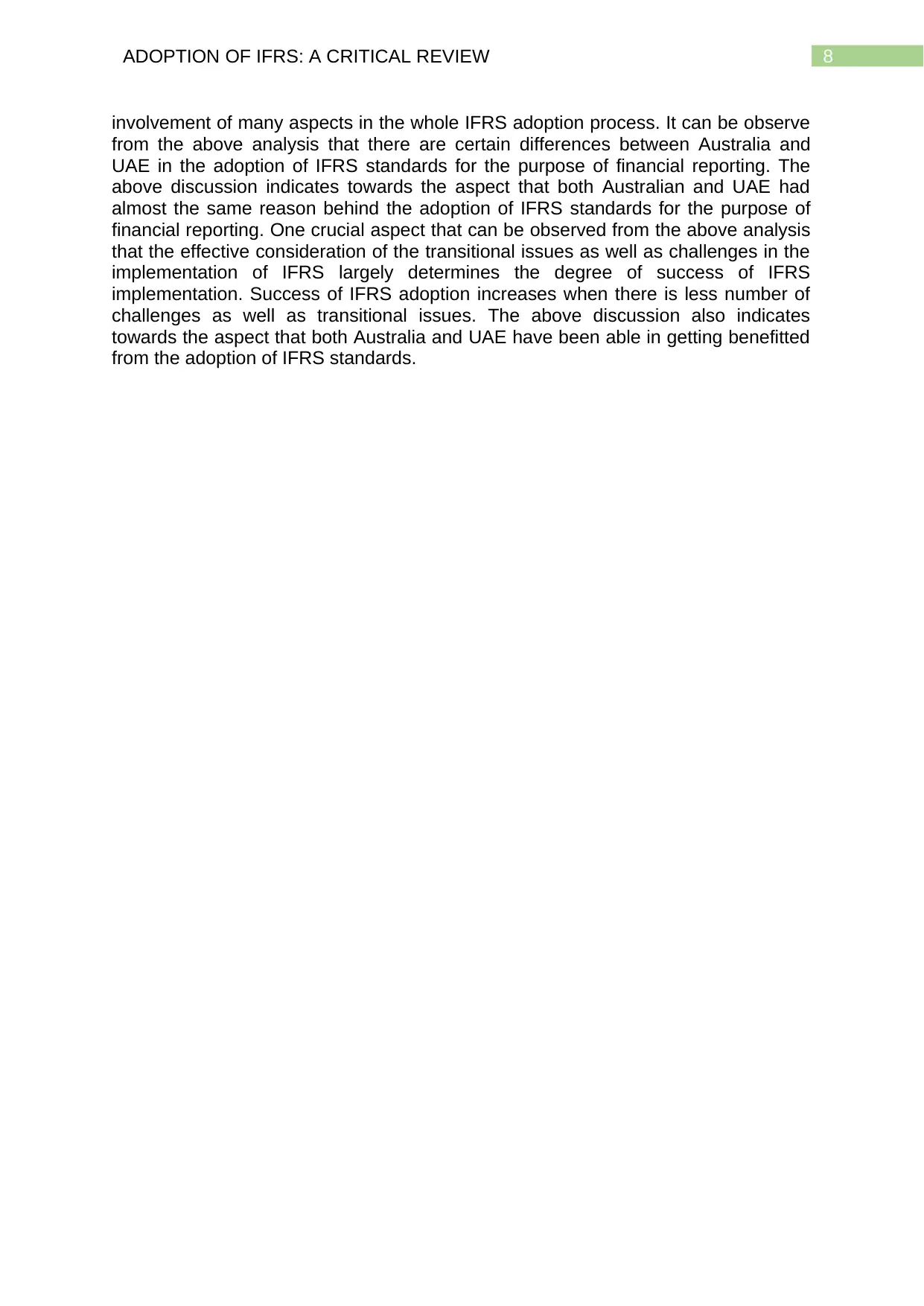
8ADOPTION OF IFRS: A CRITICAL REVIEW
involvement of many aspects in the whole IFRS adoption process. It can be observe
from the above analysis that there are certain differences between Australia and
UAE in the adoption of IFRS standards for the purpose of financial reporting. The
above discussion indicates towards the aspect that both Australian and UAE had
almost the same reason behind the adoption of IFRS standards for the purpose of
financial reporting. One crucial aspect that can be observed from the above analysis
that the effective consideration of the transitional issues as well as challenges in the
implementation of IFRS largely determines the degree of success of IFRS
implementation. Success of IFRS adoption increases when there is less number of
challenges as well as transitional issues. The above discussion also indicates
towards the aspect that both Australia and UAE have been able in getting benefitted
from the adoption of IFRS standards.
involvement of many aspects in the whole IFRS adoption process. It can be observe
from the above analysis that there are certain differences between Australia and
UAE in the adoption of IFRS standards for the purpose of financial reporting. The
above discussion indicates towards the aspect that both Australian and UAE had
almost the same reason behind the adoption of IFRS standards for the purpose of
financial reporting. One crucial aspect that can be observed from the above analysis
that the effective consideration of the transitional issues as well as challenges in the
implementation of IFRS largely determines the degree of success of IFRS
implementation. Success of IFRS adoption increases when there is less number of
challenges as well as transitional issues. The above discussion also indicates
towards the aspect that both Australia and UAE have been able in getting benefitted
from the adoption of IFRS standards.
⊘ This is a preview!⊘
Do you want full access?
Subscribe today to unlock all pages.

Trusted by 1+ million students worldwide
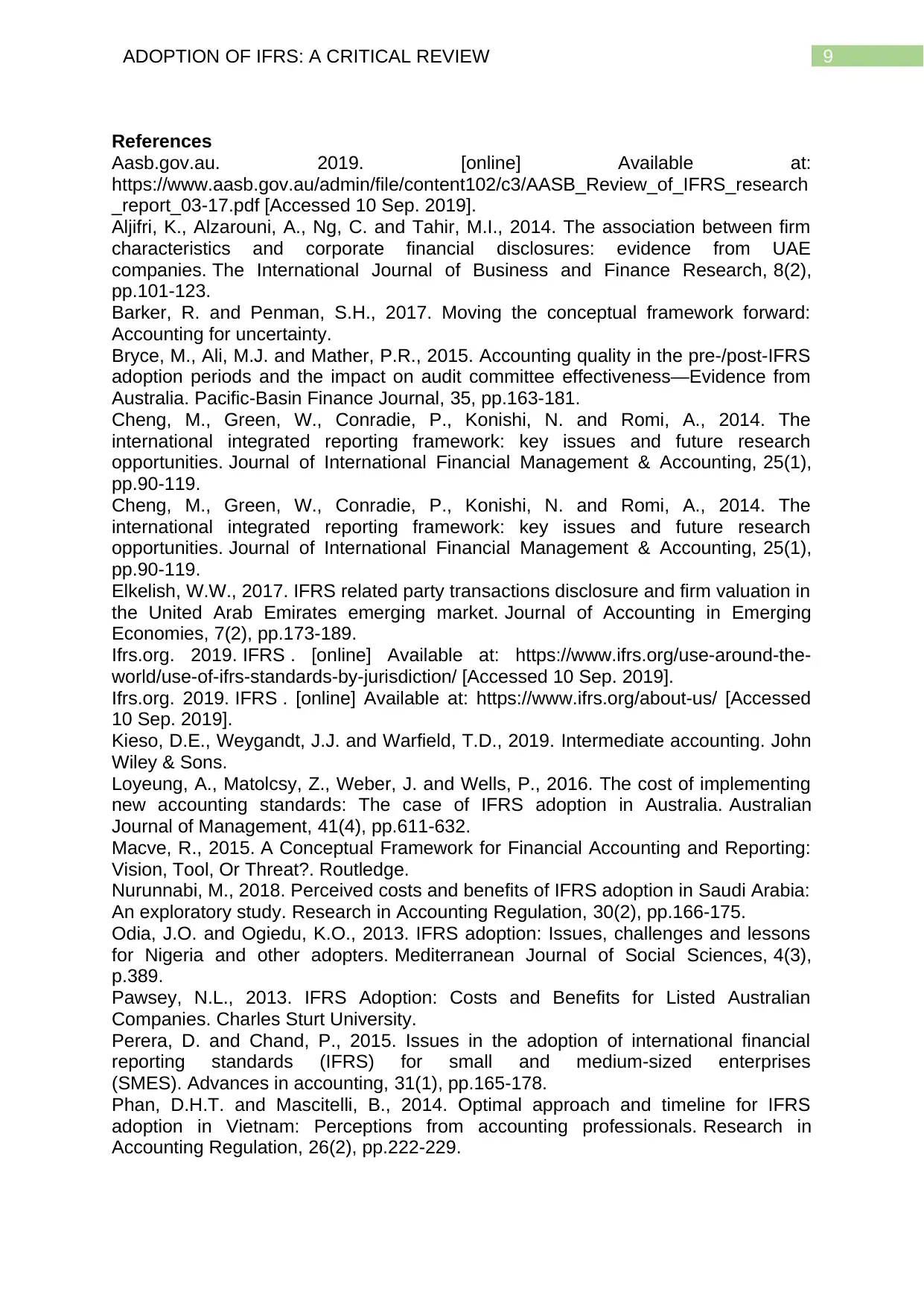
9ADOPTION OF IFRS: A CRITICAL REVIEW
References
Aasb.gov.au. 2019. [online] Available at:
https://www.aasb.gov.au/admin/file/content102/c3/AASB_Review_of_IFRS_research
_report_03-17.pdf [Accessed 10 Sep. 2019].
Aljifri, K., Alzarouni, A., Ng, C. and Tahir, M.I., 2014. The association between firm
characteristics and corporate financial disclosures: evidence from UAE
companies. The International Journal of Business and Finance Research, 8(2),
pp.101-123.
Barker, R. and Penman, S.H., 2017. Moving the conceptual framework forward:
Accounting for uncertainty.
Bryce, M., Ali, M.J. and Mather, P.R., 2015. Accounting quality in the pre-/post-IFRS
adoption periods and the impact on audit committee effectiveness—Evidence from
Australia. Pacific-Basin Finance Journal, 35, pp.163-181.
Cheng, M., Green, W., Conradie, P., Konishi, N. and Romi, A., 2014. The
international integrated reporting framework: key issues and future research
opportunities. Journal of International Financial Management & Accounting, 25(1),
pp.90-119.
Cheng, M., Green, W., Conradie, P., Konishi, N. and Romi, A., 2014. The
international integrated reporting framework: key issues and future research
opportunities. Journal of International Financial Management & Accounting, 25(1),
pp.90-119.
Elkelish, W.W., 2017. IFRS related party transactions disclosure and firm valuation in
the United Arab Emirates emerging market. Journal of Accounting in Emerging
Economies, 7(2), pp.173-189.
Ifrs.org. 2019. IFRS . [online] Available at: https://www.ifrs.org/use-around-the-
world/use-of-ifrs-standards-by-jurisdiction/ [Accessed 10 Sep. 2019].
Ifrs.org. 2019. IFRS . [online] Available at: https://www.ifrs.org/about-us/ [Accessed
10 Sep. 2019].
Kieso, D.E., Weygandt, J.J. and Warfield, T.D., 2019. Intermediate accounting. John
Wiley & Sons.
Loyeung, A., Matolcsy, Z., Weber, J. and Wells, P., 2016. The cost of implementing
new accounting standards: The case of IFRS adoption in Australia. Australian
Journal of Management, 41(4), pp.611-632.
Macve, R., 2015. A Conceptual Framework for Financial Accounting and Reporting:
Vision, Tool, Or Threat?. Routledge.
Nurunnabi, M., 2018. Perceived costs and benefits of IFRS adoption in Saudi Arabia:
An exploratory study. Research in Accounting Regulation, 30(2), pp.166-175.
Odia, J.O. and Ogiedu, K.O., 2013. IFRS adoption: Issues, challenges and lessons
for Nigeria and other adopters. Mediterranean Journal of Social Sciences, 4(3),
p.389.
Pawsey, N.L., 2013. IFRS Adoption: Costs and Benefits for Listed Australian
Companies. Charles Sturt University.
Perera, D. and Chand, P., 2015. Issues in the adoption of international financial
reporting standards (IFRS) for small and medium-sized enterprises
(SMES). Advances in accounting, 31(1), pp.165-178.
Phan, D.H.T. and Mascitelli, B., 2014. Optimal approach and timeline for IFRS
adoption in Vietnam: Perceptions from accounting professionals. Research in
Accounting Regulation, 26(2), pp.222-229.
References
Aasb.gov.au. 2019. [online] Available at:
https://www.aasb.gov.au/admin/file/content102/c3/AASB_Review_of_IFRS_research
_report_03-17.pdf [Accessed 10 Sep. 2019].
Aljifri, K., Alzarouni, A., Ng, C. and Tahir, M.I., 2014. The association between firm
characteristics and corporate financial disclosures: evidence from UAE
companies. The International Journal of Business and Finance Research, 8(2),
pp.101-123.
Barker, R. and Penman, S.H., 2017. Moving the conceptual framework forward:
Accounting for uncertainty.
Bryce, M., Ali, M.J. and Mather, P.R., 2015. Accounting quality in the pre-/post-IFRS
adoption periods and the impact on audit committee effectiveness—Evidence from
Australia. Pacific-Basin Finance Journal, 35, pp.163-181.
Cheng, M., Green, W., Conradie, P., Konishi, N. and Romi, A., 2014. The
international integrated reporting framework: key issues and future research
opportunities. Journal of International Financial Management & Accounting, 25(1),
pp.90-119.
Cheng, M., Green, W., Conradie, P., Konishi, N. and Romi, A., 2014. The
international integrated reporting framework: key issues and future research
opportunities. Journal of International Financial Management & Accounting, 25(1),
pp.90-119.
Elkelish, W.W., 2017. IFRS related party transactions disclosure and firm valuation in
the United Arab Emirates emerging market. Journal of Accounting in Emerging
Economies, 7(2), pp.173-189.
Ifrs.org. 2019. IFRS . [online] Available at: https://www.ifrs.org/use-around-the-
world/use-of-ifrs-standards-by-jurisdiction/ [Accessed 10 Sep. 2019].
Ifrs.org. 2019. IFRS . [online] Available at: https://www.ifrs.org/about-us/ [Accessed
10 Sep. 2019].
Kieso, D.E., Weygandt, J.J. and Warfield, T.D., 2019. Intermediate accounting. John
Wiley & Sons.
Loyeung, A., Matolcsy, Z., Weber, J. and Wells, P., 2016. The cost of implementing
new accounting standards: The case of IFRS adoption in Australia. Australian
Journal of Management, 41(4), pp.611-632.
Macve, R., 2015. A Conceptual Framework for Financial Accounting and Reporting:
Vision, Tool, Or Threat?. Routledge.
Nurunnabi, M., 2018. Perceived costs and benefits of IFRS adoption in Saudi Arabia:
An exploratory study. Research in Accounting Regulation, 30(2), pp.166-175.
Odia, J.O. and Ogiedu, K.O., 2013. IFRS adoption: Issues, challenges and lessons
for Nigeria and other adopters. Mediterranean Journal of Social Sciences, 4(3),
p.389.
Pawsey, N.L., 2013. IFRS Adoption: Costs and Benefits for Listed Australian
Companies. Charles Sturt University.
Perera, D. and Chand, P., 2015. Issues in the adoption of international financial
reporting standards (IFRS) for small and medium-sized enterprises
(SMES). Advances in accounting, 31(1), pp.165-178.
Phan, D.H.T. and Mascitelli, B., 2014. Optimal approach and timeline for IFRS
adoption in Vietnam: Perceptions from accounting professionals. Research in
Accounting Regulation, 26(2), pp.222-229.
Paraphrase This Document
Need a fresh take? Get an instant paraphrase of this document with our AI Paraphraser
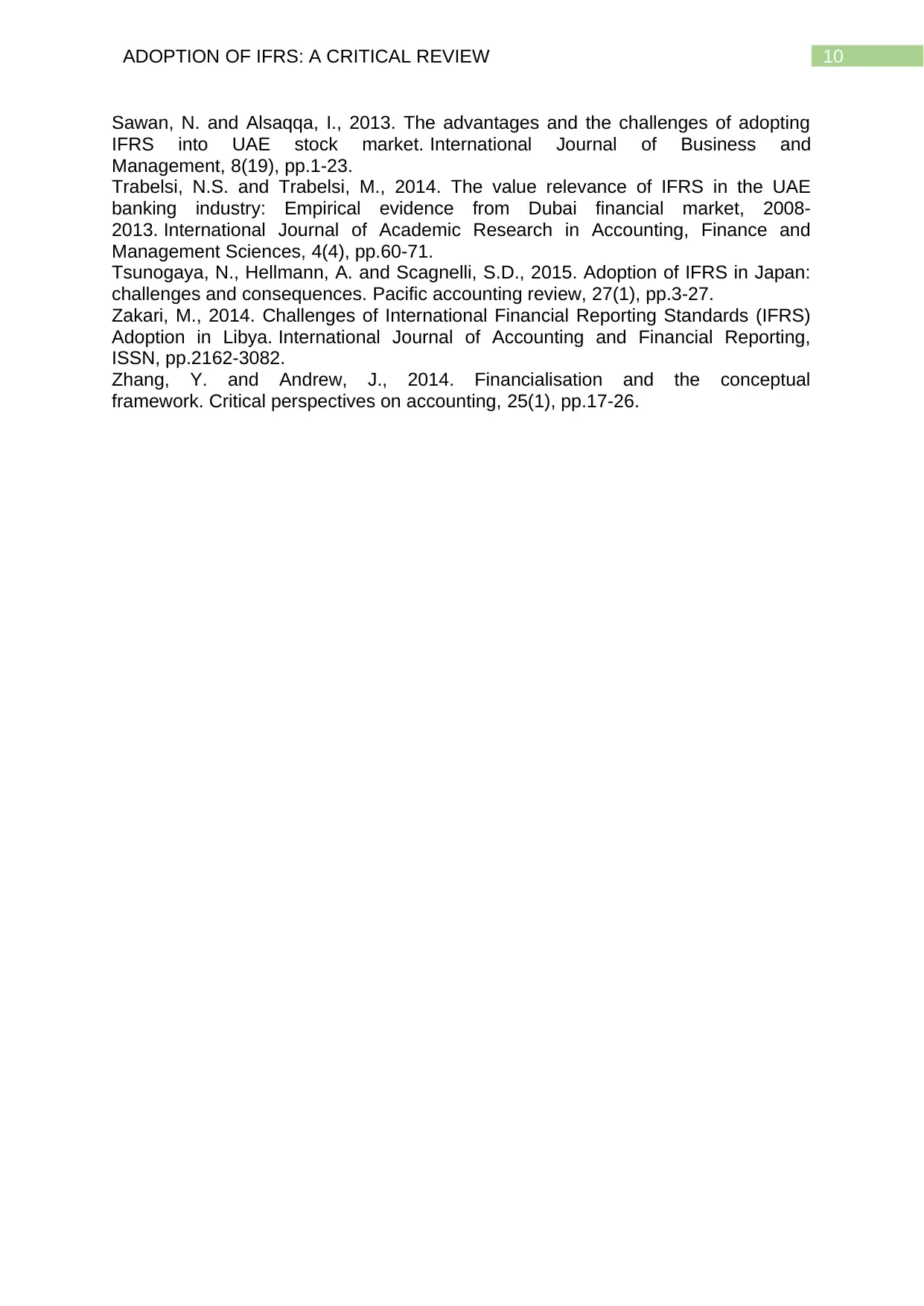
10ADOPTION OF IFRS: A CRITICAL REVIEW
Sawan, N. and Alsaqqa, I., 2013. The advantages and the challenges of adopting
IFRS into UAE stock market. International Journal of Business and
Management, 8(19), pp.1-23.
Trabelsi, N.S. and Trabelsi, M., 2014. The value relevance of IFRS in the UAE
banking industry: Empirical evidence from Dubai financial market, 2008-
2013. International Journal of Academic Research in Accounting, Finance and
Management Sciences, 4(4), pp.60-71.
Tsunogaya, N., Hellmann, A. and Scagnelli, S.D., 2015. Adoption of IFRS in Japan:
challenges and consequences. Pacific accounting review, 27(1), pp.3-27.
Zakari, M., 2014. Challenges of International Financial Reporting Standards (IFRS)
Adoption in Libya. International Journal of Accounting and Financial Reporting,
ISSN, pp.2162-3082.
Zhang, Y. and Andrew, J., 2014. Financialisation and the conceptual
framework. Critical perspectives on accounting, 25(1), pp.17-26.
Sawan, N. and Alsaqqa, I., 2013. The advantages and the challenges of adopting
IFRS into UAE stock market. International Journal of Business and
Management, 8(19), pp.1-23.
Trabelsi, N.S. and Trabelsi, M., 2014. The value relevance of IFRS in the UAE
banking industry: Empirical evidence from Dubai financial market, 2008-
2013. International Journal of Academic Research in Accounting, Finance and
Management Sciences, 4(4), pp.60-71.
Tsunogaya, N., Hellmann, A. and Scagnelli, S.D., 2015. Adoption of IFRS in Japan:
challenges and consequences. Pacific accounting review, 27(1), pp.3-27.
Zakari, M., 2014. Challenges of International Financial Reporting Standards (IFRS)
Adoption in Libya. International Journal of Accounting and Financial Reporting,
ISSN, pp.2162-3082.
Zhang, Y. and Andrew, J., 2014. Financialisation and the conceptual
framework. Critical perspectives on accounting, 25(1), pp.17-26.
1 out of 11
Related Documents
Your All-in-One AI-Powered Toolkit for Academic Success.
+13062052269
info@desklib.com
Available 24*7 on WhatsApp / Email
![[object Object]](/_next/static/media/star-bottom.7253800d.svg)
Unlock your academic potential
Copyright © 2020–2026 A2Z Services. All Rights Reserved. Developed and managed by ZUCOL.





